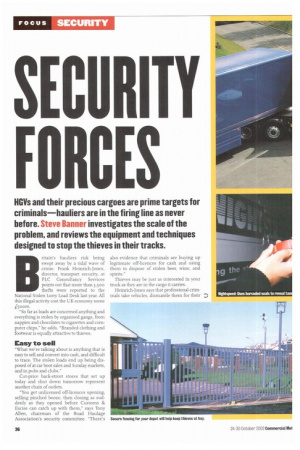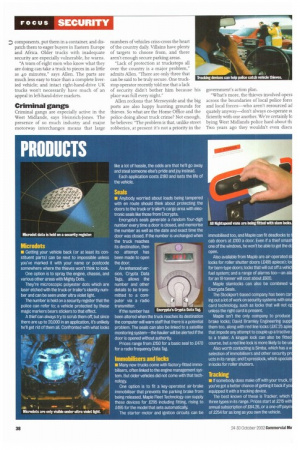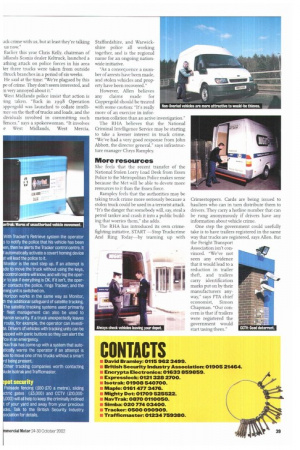CUR TY !ICES
Page 36

Page 38

Page 39

If you've noticed an error in this article please click here to report it so we can fix it.
Ms and their precious cargoes are prime targets for criminals—hauliers are in the firing line as never before. Steve Banner investigates the scale of the problem, and reviews the equipment and techniques designed to stop the thieves in their tracks.
ritain's hauliers risk being also evidence that criminals are buying up swept away by a tidal wave of legitimate off-licences for cash and using crime. Frank Heinrich-Jones. them to dispose of stolen beer, wine, and director, transport security, at spirits."
PLC Consultancy Services Thieves may be just as interested in your points out that more than 3,500 truck as they are in the cargo it carries.
thefts were reported to the Heinrich-Jones says that professional crim. National Stolen Lorry Load Desk last year. All inals take vehicles, dismantle them for their this illegal activity cost the UK economy some f5oom.
"So far as loads are concerned anything and everything is stolen by organised gangs, from nappies and chocolates to cigarettes and computer chips," he adds. "Branded clothing and footwear is equally attractive to thieves.
Easy to sell
"What we're talking about is anything that is easy to sell and convert into cash, and difficult to trace. The stolen loads end up being disposed of at car boot sales and Sunday markets, and in pubs and clubs."
Cut-price back-street stores that set up today and shut down tomorrow represent another chain of outlets.
"You get unlicensed off-licences opening, selling pinched booze, then closing as suddenly as they opened before Customs & Excise can catch up with them," says Tony Allen, chairman of the Road Haulage Association's security committee. "There's
p components, put them in a container, and dispatch them to eager buyers in Eastern Europe and Africa. Older trucks with inadequate security are especially vulnerable, he warns. "A team of eight men who lcnow what they are doing can take a truck to pieces in as little as 40 minutes," says Allen. The parts are much less easy to trace than a complete liveried vehicle; and intact right-hand-drive UK trucks won't necessarily have much of an appeal in left-hand-drive markets.
Criminal gangs
Criminal gangs are especially active in the West Midlands, says Heinrich-Jones. The presence of so much industry and major motorway interchanges means that large numbers of vehicles criss-cross the heart of the country daily. Villains have plenty of targets to choose from, and there aren't enough secure parking areas.
"Lack of protection at truckstops all over the country is a major problem." admits Allen. "There are only three that can be said to be truly secure. One truckstop operator recently told me that a lack of security didn't bother him because his place was full every night."
Allen reckons that Merseyside and the big ports are also happy hunting grounds for thieves. So what are the Home Office and the police doing about truck crime? Not enough, he believes: "The problem is that, unlike street robberies, at present it's not a priority in the government's action plan.
"What's more, the thieves involved opera across the boundaries of local police force and local forces—who aren't resourced ad quately anyway—don't always co-operate si ficiently with one another. We're certainly lc bying West Midlands police hard about th Two years ago they wouldn't even discu
ack crime with us, but at least they're talking us now."
Earlier this year Chris Kelly, chairman of idlands Scania dealer Keltruck, launched a .athing attack on police forces in his area ter three trucks were taken from outside Atruc.k branches in a period of six weeks.
He said at the time: "We're plagued by this pe of crime. They don't seem interested, and m very annoyed about it."
West Midlands police insist that action is ing taken. "Back in 1998 Operation Dppergold was launched to collate intellilice on the theft of trucks and loads, and the .dividuals involved in committing such fences," says a spokeswoman. "It involves e West Midlands, West Mercia, Staffordshire, and Warwickshire police all working together, and is the regional name for an ongoing nationwide initiative.
"As a consequence a number of arrests have been made, and stolen vehicles and property have been recovered."
However, Allen believes any claims made for Coppergold should be treated with some caution: "It's really more of an exercise in information collation than an active investigation."
The RI IA believes that the National Criminal Intelligence Service may be starting to take a keener interest in truck crime. "We've had a very good response from John Abbott, the director general," says infrastructure manager Chrys Rampley.
More resources
She feels that the recent transfer of the National Stolen Lorry Load Desk from Essex Police to the Metropolitan Police makes sense because the Met will be able to devote more resources to it than the Essex force.
Ram pley feels that the authorities may be taking truck crime more seriously because a stolen truck could be used in a terrorist attack. "Its the danger that somebody will, say, steal a petrol tanker and crash it into a public building that worries them," she adds.
The RHA has introduced its own crimefighting initiative, START —Stop Truckcrime And Ring Today—by teaming up with Crimestoppers. Cards are being issued to hauliers who can in turn distribute them to drivers. They carry a hotline number that can be rung anonymously if drivers have any information about vehide crime.
One step the government could usefully take is to have trailers registered in the same way that trucks are registered, says Allen. But the Freight Transport Association isn't convinced. "We've not seen any evidence that it would lead to a reduction in trailer theft, and trailers carry identification marks put on by their manufacturers anyway," says PTA chief economist, Simon Chapman. Our concern is that if trailers were registered the government would start taxing them."
























































































































































